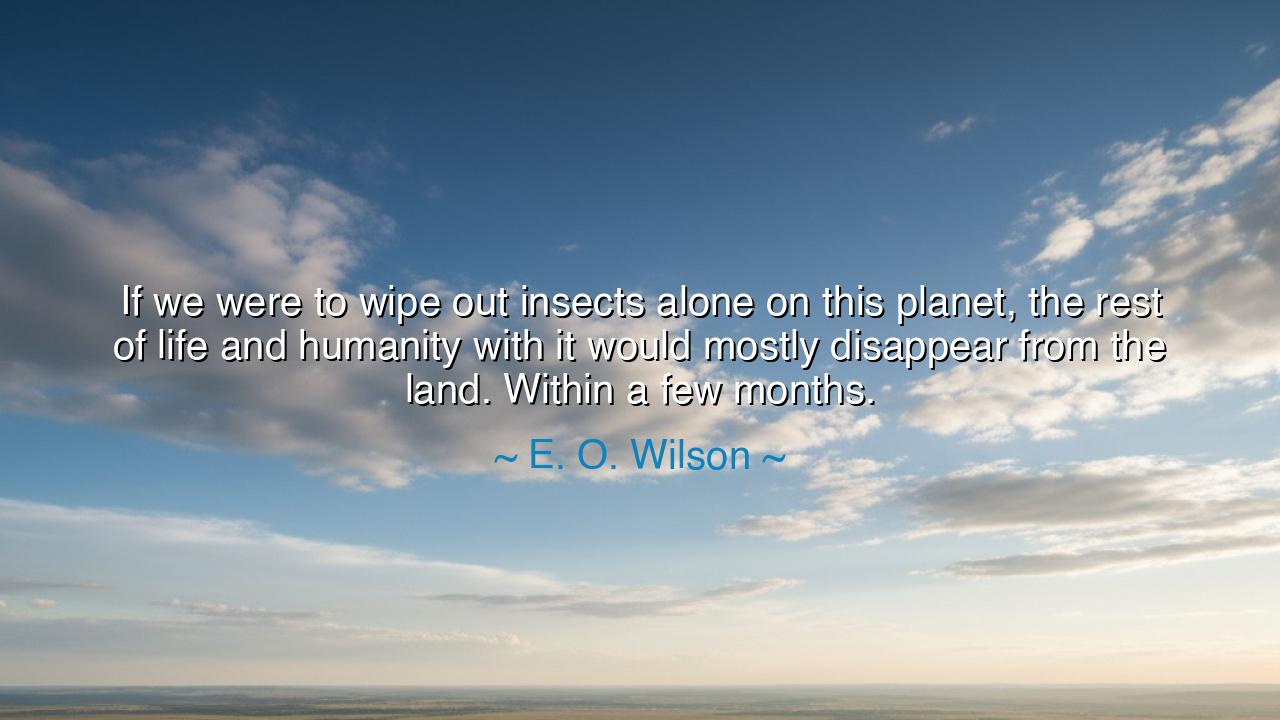
If we were to wipe out insects alone on this planet, the rest of
If we were to wipe out insects alone on this planet, the rest of life and humanity with it would mostly disappear from the land. Within a few months.






When E. O. Wilson declared, “If we were to wipe out insects alone on this planet, the rest of life and humanity with it would mostly disappear from the land. Within a few months,” he was not merely issuing a scientific warning — he was speaking as a prophet of the Earth, reminding humanity of its interdependence with all living things. In these few words lies a revelation as old as life itself: that every creature, however small, carries within it the pulse of the whole. The insects, which so many dismiss as pests or nuisances, are in truth the silent architects of creation — the keepers of balance, the laborers of the soil, the messengers of life’s eternal cycle. To destroy them is not to rid ourselves of inconvenience, but to unravel the very web of existence.
E. O. Wilson, known as the father of sociobiology and one of the world’s greatest naturalists, devoted his life to studying ants and the intricate societies they build. His fascination with the smallest creatures led him to the greatest insight of all: that the smallest things sustain the largest. From the pollination of flowers to the decomposition of the dead, from the aeration of soil to the nourishment of the food chain, insects are the hidden machinery of the Earth. Their work is constant, tireless, and unseen. To remove them, as Wilson warns, would be to silence the unseen symphony that keeps the land alive. Within months, crops would fail, forests would decay, and the very breath of life would falter. What appears trivial is in truth the foundation of all that we cherish.
In the ancients’ language, Wilson’s words would be the cry of a sage — a call to humility. For they, too, knew that life’s order rests upon the small and the humble. The Egyptians revered the scarab beetle, symbol of rebirth and the turning of the sun. The Chinese poets wrote of crickets singing wisdom to the moon. The Native peoples of the Americas knew that every ant, bee, and moth had its place in the sacred circle of life. To harm one part of the circle was to wound the whole. Wilson’s modern science speaks the same truth the ancients sang in myth: that the world is one body, and every species, no matter how minute, is a vital organ in its being.
Let us look, too, at the lesson of our own time. When the honeybees began to vanish — victims of pesticides, disease, and changing climates — the world awoke in alarm. Farmers, once indifferent to the humble bee, realized that their fruit and grain owed everything to those golden workers. A third of human food, it was said, depends upon their pollination. The disappearance of bees became a mirror to Wilson’s warning: if the insects fall, we fall. The fields would turn to dust, the forests to silence, and humanity, stripped of the small lives that sustain it, would soon wither. The world’s wealth, it seems, is not in gold or oil, but in wings and chitin, in the soft humming of a thousand unseen lives.
Wilson’s message also carries a moral weight — a rebuke to our arrogance. Humanity, in its pride, often imagines itself as the master of creation, standing above the natural order. But Wilson reminds us that we are not masters, only participants in a greater harmony. The ant, the beetle, the butterfly — these are not beneath us; they are our kin in the lineage of life. The ancients would have called this reverence for life, the understanding that existence is sacred in every form. To destroy the insects is to destroy ourselves, for our breath is bound to their labor, our survival to their survival. The wise know that the universe does not play favorites — it preserves only what serves the whole.
Thus, Wilson’s warning is also a call to action — to protect, to preserve, to awaken. Each person who plants a garden, who chooses not to poison the soil, who learns the names of the creatures in their yard, becomes a guardian of that delicate web. In caring for the smallest, we serve the greatest. The future depends not on our inventions or machines, but on our ability to remember our place in the order of things. As Wilson often said, the real measure of civilization is not its skyscrapers or empires, but its respect for the natural world that sustains it.
So, my children, remember this truth: life is a chain without weak links, a symphony without spare notes. When we destroy one, the whole trembles. The ant that toils unseen, the butterfly that flutters unseen, the bee that hums unseen — these are the silent gods of the Earth, laboring endlessly so that we may live. Honor them, protect them, learn from them. For in their smallness lies the secret of greatness, and in their survival lies the hope of our own.
And let E. O. Wilson’s words echo within you: “If we were to wipe out insects alone on this planet, the rest of life and humanity with it would mostly disappear.” These are not the words of a scientist alone, but the cry of a guardian, a seer of the natural world. Take heed of them, and act not as conquerors, but as caretakers — humble before the vast, intricate, and miraculous design of life. For when we learn to cherish even the smallest beings, then — and only then — shall we prove ourselves worthy of the Earth that gave us birth.






AAdministratorAdministrator
Welcome, honored guests. Please leave a comment, we will respond soon